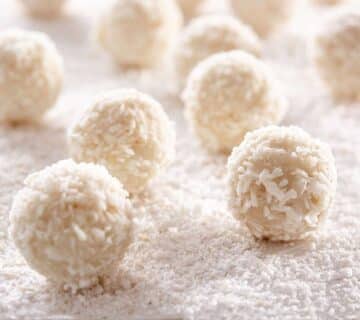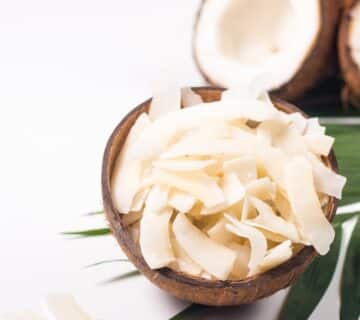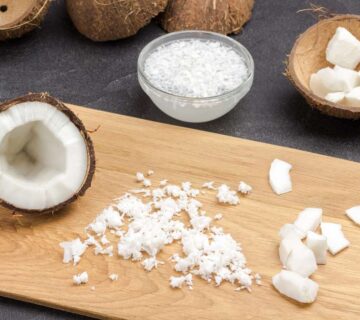Dogs, our loyal companions, often share our lives, including mealtime. As pet owners, it’s natural to wonder about the safety and nutritional value of various foods, especially those we may enjoy ourselves.
As you know, dogs have some foods that should not be consumed, such as chocolate, grapes and many more. Because these foods can be harmful to dogs and can even lead to death.
Desiccated coconut is a common kitchen ingredient, but is it safe and beneficial for our furry friends? In this article we will discuss whether desiccated coconut can be consumed for dogs and what are the benefits for dogs.
What is Desiccated Coconut?
Desiccated coconut refers to dried, finely shredded or flaked coconut meat. It is a form of coconut that has been subjected to a dehydration process, removing the majority of its moisture content. The process involves grating the white, inner flesh of the coconut, then drying it to create the characteristic texture of desiccated coconut.
Can Dogs Eat Desiccated Coconut?
Dog lovers need not worry, since dogs can still consume desiccated coconut. But keep in mind, as long as it is within reasonable limits. The safety of feeding desiccated coconut to dogs depends on several factors. Let’s break down the key considerations:
1. Nutritional Content
Nutritional value in desiccated coconut is rich in healthy fats, fiber, and certain vitamins and minerals. These nutrients can contribute to a dog’s overall well-being when consumed in moderation.
2. Moderation is Key
While coconut can offer nutritional benefits, moderation is crucial. The high-fat content may lead to digestive upset or weight issues if consumed excessively.
3. Preparation Matters
Plain, unsweetened desiccated coconut is the safest option for dogs. Avoid varieties with added sugars, sweeteners, or flavorings, as these can be harmful.
4. Potential Benefits for Dogs
Coconut contains medium-chain triglycerides (MCTs), which may have potential health benefits, including supporting the immune system and promoting a shiny coat.
The fiber content in coconut can aid in digestion and may be beneficial for dogs with gastrointestinal issues.
5. Potential Risks
While healthy fats are beneficial, excessive fat intake can lead to pancreatitis, a serious condition in dogs.Desiccated coconut is calorie-dense, and overfeeding can contribute to weight gain.
Benefits Desiccated Coconut for Dogs
Coconuts contain lauric acid, a fatty acid known for repelling fleas. Additionally, it has demonstrated the ability to reduce inflammation, accelerate wound healing, and alleviate arthritic pain. Loaded with antioxidants, coconut enhances the immune system and aids in eliminating toxins from the body.
When given in appropriate amounts, coconut can effectively manage your dog’s weight and positively impact their digestive system and gut health. It plays a role in fighting off viruses and treating ear yeast infections, particularly prevalent in certain dog breeds like Beagles, Cocker Spaniels, and Poodles.
For dogs dealing with itchy, dry skin, or allergies, the consumption or topical application of coconut can provide relief, soothing the skin and promoting a healthy, glossy coat. Lastly, coconut has cognitive benefits, keeping your dog’s brain sharp, improving cognitive function, and potentially warding off dementia.
Desiccated Coconut in Pet Care Industries
Beyond being a potential treat for our canine companions, desiccated coconut plays a significant role in various pet care industries, particularly in the production of pet food. Here’s how desiccated coconut contributes to the well-being of our pets:
A. Nutrient Inclusion
Desiccated coconut is often included in pet food formulations to provide essential nutrients. Its natural fats and fiber can contribute to a balanced diet for pets.
B. Palatability and Texture
The flavor and texture of desiccated coconut can enhance the palatability of pet food, making it more appealing to our furry friends.
C. Coconut Oil Extraction
Desiccated coconut serves as a raw material for extracting coconut oil, another ingredient that finds applications in pet care products, including grooming items and supplements.
Related article: Difference Between High-Fat and Low-Fat Desiccated Coconut
Balance the Portion of Desiccated Coconut for Your Dog’s Health!
So can dogs eat desiccated coconut? The answer is absolutely yes! Dogs can consume coconut as long as it is within reasonable limits. If given in excess, there may be other risks that can occur. These risks may include gastric upset, bloating, and diarrhea. Then coconut has fat content that can cause obesity and pancreatitis in dogs. Avoid sweetened dried coconut as they are very high in sugar content. Dried coconut without added sugar can be given as an occasional treat or sprinkled on dog food once in a while.
It’s worth noting that dogs can also have allergies to coconut. This can be recognized if symptoms such as skin irritation, digestive upset, respiratory problems, swelling and lethargy appear. If these symptoms appear, you better take it to the vet immediately. Because allergies can be life threatening.
For pet care industries seeking reliable sources of desiccated coconut raw materials, Sari Coconut stands as a trusted Supplier of Coconut Derivatives Products from Indonesia.
Committed to sustainability and quality, Sari Coconut provides high-quality coconut derivatives products for use in various pet care products. With a global reach, Sari Coconut ensures that industries worldwide have access to premium raw materials for pet food production. So contact Sari Coconut and consult your needs now!
FAQ
1. Is desiccated coconut safe for dogs?
Yes, plain, unsweetened desiccated coconut can be safe for dogs in moderation. It provides healthy fats and fiber, but excessive consumption may lead to digestive issues or weight gain.
2. Can dogs eat sweetened or flavored desiccated coconut?
It’s advisable to avoid sweetened or flavored varieties, as added sugars and flavorings can be harmful to dogs and contribute to health issues.
3. What are the potential benefits of desiccated coconut for dogs?
Desiccated coconut, in moderation, can offer healthy fats and fiber. The medium-chain triglycerides (MCTs) in coconut may support the immune system and contribute to a shiny coat.
4. Can desiccated coconut cause pancreatitis in dogs?
Excessive fat intake, including that from desiccated coconut, can contribute to pancreatitis in dogs. It’s crucial to feed coconut in moderation.
5. How should desiccated coconut be introduced to a dog’s diet?
Introduce desiccated coconut gradually and in small amounts. Monitor your dog for any signs of digestive upset, and consult with a veterinarian if you have concerns.






